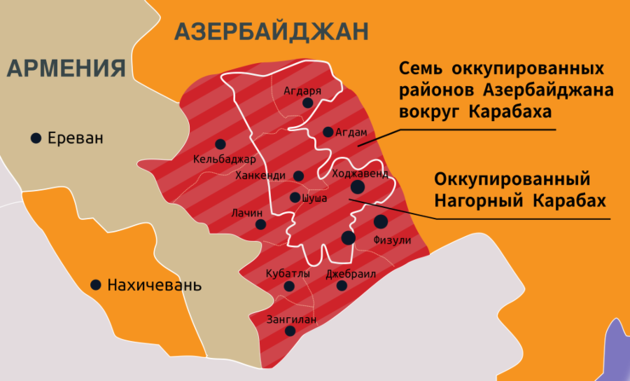There are several unresolved conflicts in the South Caucasus, which have gradually moved from the regional to the subregional level over the past 30 years. The most bloody source of regional tension was the Karabakh conflict, which directly affects the structure of international relations between Georgia, Armenia and Azerbaijan, as well as states that have regional borders with the South Caucasus republics.
In terms of the conflict-analysis methodology, the Karabakh conflict is not a national-religious clash between the Armenian and Azerbaijani communities, experiencing mental intolerance towards each other. This is a deeply politicized conflict in which cultural and ethnic mobilization performs one of the key functions. In such cases, the politicization of the interests of individual peoples may not correspond to the real needs of societies, which may be subordinated to the interests of state elites. Both in Armenia and in the unrecognized "NKR" the so-called elite is represented by trade and financial monopolies or persons who closely cooperate with local big business. Such a political platform, which primarily provides for the satisfaction of the interests of local financial players, acts to the detriment of the macroeconomic opportunities for the development of the entire region and does not contribute to any progress in the negotiation process, forcing society to adjust to the interests of regional business, presenting itself as ideas of national security.
The conflict-analysis methodology affects the negotiation process. Baku is extremely pedantic about the negotiations, not departing a single step from its long-term political line, since the territorial integrity of Azerbaijan is set at the international level. Azerbaijan is interested in maintaining the intensive nature of the negotiation process. Yerevan places less emphasis on international legislation, preferring to put more effort into international recognition of the legitimization of the occupation. Armenia treats the list of countries and U.S. states that recognize "Karabakh statehood" with particular trepidation. The legitimization of the occupation takes a lot of time, since it is influenced by trends in international politics, so Yerevan is not interested in intensifying the negotiations, believing that "the war has been won, the only thing left to do is win recognition."
The Karabakh conflict dates back to the collapse of the Soviet Union. Not long before and shortly after the collapse of the USSR, it represented elements of a civil war or communal confrontation. At first, it was not about the clash of interests of major geopolitical actors, who later looked at the Karabakh problem through the prism of the balance of power in the region. The interest of at least one of the parties (in this case, Armenia) in involving new political players in the settlement of the problem in order to politically support its interests has partly hurt the sovereignty of the diplomatic settlement.
Leading geopolitical actors - Russia, the U.S., EU countries - are involved in the problem of resolving the Karabakh conflict. The mediation activities of the OSCE, as well as of a number of European and Middle Eastern countries, contributed to the maintenance of the negotiation process. At the same time, there is no place for political altruism in geopolitics, therefore, international participation implies the involvement and subsequent observance of the interests of some mediator's mediating mission, which has its own view of maintaining the balance of power in the South Caucasus.
Neglecting the importance of the negotiation process, eroding the interests of society in the geopolitical space serves to maintain information attacks and horror stories, which are used by the Armenian media to frighten the population. The way Armenian news agencies present other participants in the negotiation process as vassals of regional geopolitics reflects the real interest of politicians in a diplomatic settlement of the Karabakh conflict.






